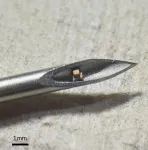(Press-News.org) In the decade since the advent of CRISPR-Cas9 gene editing, researchers have used the technology to delete or change genes in a growing number of cell types. Now, researchers at Gladstone Institutes and UC San Francisco (UCSF) have added human monocytes--white blood cells that play key roles in the immune system--to that list.
The team has adapted CRISPR-Cas9 for use in monocytes and shown the potential utility of the technology for understanding how the human immune system fights viruses and microbes. Their results were published online today in the journal Cell Reports.
"These experiments set the stage for many more studies on the interactions between major infectious diseases and human immune cells," says senior author Alex Marson, MD, PhD, director of the Gladstone-UCSF Institute of Genomic Immunology and associate professor of medicine at UCSF.
"This technology opens doors for identifying the human genes most important to the function of monocytes and for coming up with new therapeutic strategies against a range of pathogens," adds co-senior author Nevan Krogan, PhD, senior investigator at Gladstone and director of the Quantitative Biosciences Institute at UCSF.
From One Immune Cell to Another
Monocytes are immune cells with a broad range of roles in defending the human body from pathogens. As part of their normal function, monocytes can give rise to two other immune cell types: macrophages, which engulf and destroy foreign material in the body, and dendritic cells, which help recognize pathogens and trigger more specific immune responses.
Marson's team has previously studied T cells, a different class of immune cell, using CRISPR-Cas9 technology to selectively remove genes from the cells and observe the consequences. Their results have helped point toward targets for new immune therapies that make T cells more effective at fighting disease.
Monocytes, however, are notoriously hard to study in the lab. Few of the cells circulate in the blood and they behave differently in a petri dish than they would inside the body. So, applying CRISPR-Cas9 to monocytes required tweaking the standard protocols. The team had to develop an approach that would not only alter the genes inside monocytes, but ensure that those edited cells were still functional.
"Editing monocytes was challenging, but we felt it was very important to replicate the success we had obtained with T cells in other immune cells," says Joseph Hiatt, the study's first author and a graduate student in the Marson and Krogan labs.
A Way to Study Infections
The group showed that the monocytes edited with their CRISPR-based approach could still give rise to both macrophages and dendritic cells. To confirm whether these new edited cells behaved normally, the researchers infected cells grown in the lab with the microbe that causes tuberculosis. Macrophages originating from edited monocytes, they found, were still capable of engulfing the pathogen.
The researchers next showed that using CRISPR-Cas9 to remove the gene SAMHD1 from monocytes--and therefore the resulting macrophages--boosted more than fifty-fold the infection of cells by HIV. While SAMHD1 was already known to protect human cells from HIV, the experiment confirmed the success of their gene-editing approach in monocytes and its promise for studying diseases.
Krogan's lab has spent recent years cataloging human proteins that viruses use to infect cells and propagate. His research has included HIV, tuberculosis, Ebola virus, and Dengue virus--viruses known to target macrophages and dendritic cells. The new ability to edit genes in these cells will help his team validate their findings and identify vulnerabilities that may help combat these diseases in the future. It could also point toward targets for drugs that help boost the ability of monocytes to fight infections, or block viruses from hijacking monocytes in the first place.
"Now that we're confident we can edit monocytes successfully, our approach will allow us to study these cells in depth, and understand their roles in infectious diseases," says Devin Cavero, co-first author of the study and former UCSF research associate.
INFORMATION:
About the Study
The paper "Efficient Generation of Isogenic Primary Human Myeloid Cells Using CRISPR-Cas9 Ribonucleoproteins" was published by the journal Cell Reports on May 11, 2021: https://www.cell.com/cell-reports/fulltext/S2211-1247(21)00439-3.
Other authors are: Michael J. McGregor, Theodore L. Roth, Kelsey M. Haas, Ujjwal Rathore, Anke Meyer-Franke, Eric Shifrut, Youjin Lee, Vigneshwari Easwar Kumar, David E. Gordon, Jason A. Wojcechowskyj, Judd F. Hultquist, and Krystal A. Fontaine of Gladstone; Weihao Zheng, Jonathan M. Budzik, David Wu, Mohamed S. Bouzidi, Eric. V. Dang, Satish K. Pillai, and Joel D. Ernst of UC San Francisco; and Jeffery S. Cox of UC Berkeley.
The work was funded by the National Institutes of Health (P50 AI150476, U19 AI135990, P01 AI063302, R01 AI150449, and R01 AI124471) and the James B. Pendleton Charitable Trust.
The researchers involved are also supported in part by the National Science Foundation, a Ruth L. Kirschstein Fellowship, gifts from J. Aronov, G. Hoskin, K. Jordan, B. Bakar and the Caufield family, Gladstone, the Innovative Genomics Institute, the Parker Institute for Cancer Immunotherapy, a Career Award for Medical Scientists from the Burroughs Wellcome Fund, a Lloyd J. Old STAR award from the Cancer Research Institute, the Chan Zuckerberg Biohub, Vir Biotechnology, F. Hoffmann-LaRoche, and the BioFulcrum Viral and Infectious Disease Research Program at Gladstone.
About Gladstone Institutes
To ensure our work does the greatest good, Gladstone Institutes (https://gladstone.org) focuses on conditions with profound medical, economic, and social impact--unsolved diseases. Gladstone is an independent, nonprofit life science research organization that uses visionary science and technology to overcome disease. It has an academic affiliation with the University of California, San Francisco.
Pregnant women who develop severe COVID-19 infections that require hospitalization for pneumonia and other complications may not be more likely to die from these infections than non-pregnant women. In fact, they may have significantly lower death rates than their non-pregnant counterparts. That is the finding of a new study published today in the Annals of Internal Medicine conducted by researchers at the University of Maryland School of Medicine (UMSOM).
The study examined medical records from nearly 1,100 pregnant women and more than 9,800 non-pregnant patients aged 15 to 45 who were hospitalized with COVID-19 and pneumonia. Slightly less than 1 percent of the pregnant patients died from COVID-19 compared to 3.5 percent of non-pregnant patients, according to the study findings.
There ...
New York, NY--May 11, 2021--Widely used to monitor and map biological signals, to support and enhance physiological functions, and to treat diseases, implantable medical devices are transforming healthcare and improving the quality of life for millions of people. Researchers are increasingly interested in designing wireless, miniaturized implantable medical devices for in vivo and in situ physiological monitoring. These devices could be used to monitor physiological conditions, such as temperature, blood pressure, glucose, and respiration for both diagnostic and therapeutic ...
2003 was a big year for virologists. The first giant virus was discovered in this year, which shook the virology scene, revising what was thought to be an established understanding of this elusive group and expanding the virus world from simple, small agents to forms that are as complex as some bacteria. Because of their link to disease and the difficulties in defining them--they are biological entities but do not fit comfortably in the existing tree of life--viruses incite the curiosity of many people.
Scientists have long been interested in how viruses evolved, especially when it comes to giant viruses that can produce new viruses with very little help from the host--in contrast to most small viruses, which utilize the host's machinery to replicate. ...
Surgical cesarean births can expose new mothers to a range of health complications, including infection, blood clots and hemorrhage. As part of Healthy People 2020 and other maternal health objectives, the state of California exerted pressure to reduce cesarean deliveries, and statewide organizations established quality initiatives in partnership with those goals. In this study, researchers from Stanford University and the University of Chicago examined unit culture and provider mix differences on hospital and delivery units to identify characteristics of units that successfully reduced their cesarean delivery rates. The mixed-methods study surveyed ...
From the branching pattern of leaf veins to the variety of interconnected pathways that spread the coronavirus, nature thrives on networks -- grids that link the different components of complex systems. Networks underlie such real-life problems as determining the most efficient route for a trucking company to deliver life-saving drugs and calculating the smallest number of mutations required to transform one string of DNA into another.
Instead of relying on software to tackle these computationally intensive puzzles, researchers at the National Institute of Standards and Technology ...
Most patients with depression are treated in primary care, however, relatively few clinical trials for treating depression have focused on primary care. Researchers at the Vrije University Amsterdam examined the effects of the two major approaches to treating depression: psychotherapy and pharmacotherapy, as well as combined treatment and care-as-usual. The study integrated the results of 58 randomized controlled trials with a total of 9,301 patients. Results concluded that both psychotherapy and pharmacotherapy were significantly more effective than care-as-usual or waitlist control. However, they found no significant difference between psychotherapy and pharmacotherapy as stand-alone treatments. Combined treatment, particularly in studies that included ...
It's widely understood that people taking a common class of antibiotics, like ciprofloxacin and levofloxacin, run the risk of tendonitis and tendon ruptures. However, a new analysis sheds light on newer, third-generation fluoroquinolones and suggests they may have a lower risk of Achilles tendon rupture. Researchers from Jichi Medical University in Tochigi, Japan, used health care administrative data to identify 504 patient cases of Achilles tendon ruptures with co-occurrence of antibiotics. They found that third-generation fluoroquinolones were not associated with an increase in Achilles tendon rupture. First- ...
DURHAM, N.C. -- You enter a room and quickly scan the crowd to gain a sense of who's there - how many men versus women. How reliable is your estimate?
Not very, according to new research from Duke University.
In an experimental study, researchers found that participants consistently erred in estimating the proportion of men and women in a group. And participants erred in a particular way: They overestimated whichever group was in the minority.
"Our attention is drawn to outliers," said Mel W. Khaw, a postdoctoral research associate at Duke and the study's lead author. "We tend to overestimate people who stand out in a crowd."
For the study, which appears ...
Researchers from the Cleveland Clinic and Takeda Pharmaceutical Company conducted a study to evaluate the effectiveness of shared medical appointments for people with pre-diabetes compared with a group of patients receiving usual care. Shared medical appointments are typically delivered in a medical clinic by physicians and other health care providers. Within the context of this study, shared medical appointments consisted of patients consulting with their doctors one-on-one and then joining a group of similar patients to set goals and review lab results with the same family ...
Between 11% to 40% of adults in the United States experience chronic pain, and primary care physicians may feel ill-equipped to effectively and safely care for patients with chronic pain, addiction or both. Researchers from Tufts University conducted a study to evaluate the effectiveness of an interdisciplinary consultation service that supports primary care physicians who care for patients experiencing chronic pain and addiction. The goal was to identify new and effective strategies that clinics can use to support PCPs.
From that interdisciplinary consultation service, the researchers collected ...




